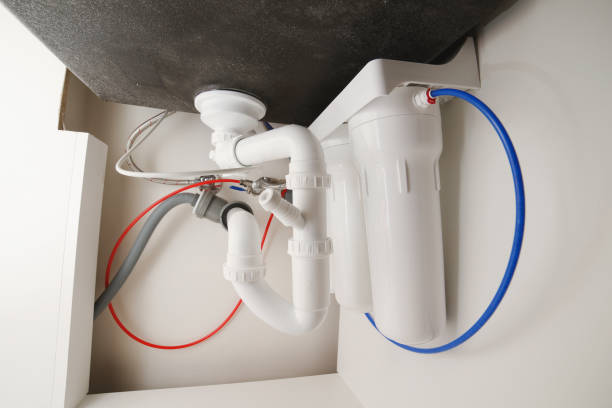What Is a Whole House Water Filter, and Do You Need One?
When you think about the water that comes out of your faucets, do you ever wonder what’s really in it? Whether you’re using city water or well water, the chances are that your tap water has contaminants. That’s where a whole house water filter comes in. This system provides filtered water at every tap in your home, ensuring that the water you’re using is clean, safe, and free from harmful chemicals or particles.
If you’re on the fence about whether you need one or how to choose the right system, you’re in the right place! This guide will break down the importance of whole house water filters and offer actionable advice to help you make an informed decision for your home.
Why Should You Consider a Whole House Water Filter?
Think about all the ways you use water in your home—drinking, cooking, bathing, washing clothes, and even watering plants. If any of that water is contaminated, it can affect your health, the longevity of your appliances, and even your skin. A whole house water filter helps ensure that clean, filtered water flows from every faucet, reducing risks from pollutants like chlorine, sediment, or heavy metals.
Here are some good reasons to consider installing one:
Better Health: If you’re concerned about chemicals in your tap water, a whole house water filter can eliminate chlorine, pesticides, and even lead, which might be present in older plumbing systems.
Improved Skin & Hair: If you’ve ever noticed your skin drying out after a shower or your hair feeling greasy, it could be due to hard water or chemicals. A whole house water filter can help resolve these issues.
Cleaner Appliances: Hard water and mineral deposits can damage appliances like dishwashers and water heaters. A filtration system can extend their life by keeping the buildup in check.
Tastier Water: Whether you drink from the tap or use water for cooking, filtered water tastes better. It’s free of chlorine or other chemicals that can leave an aftertaste.
Tips for Choosing the Right Whole House Water Filter System
Not all water filtration systems are created equal, so it’s important to select the one that works best for your needs. Below are some expert tips to guide you through this process:
Identify the Type of Contaminants in Your Water: Before buying a whole house water filter, have your water tested. Many companies offer water testing kits, or you can hire a professional service. Knowing what’s in your water will help you choose the right filter. For example, if you’re using well water, you may need a system designed to handle high levels of iron or bacteria.
Consider Your Home Size and Water Usage: The size of your household and your daily water consumption are important when selecting a whole house water filter. If you have a large family and use a lot of water, you’ll need a larger system that can handle the increased demand. It’s always best to pick a filter that’s built for your household size to avoid straining the system.
Check the Flow Rate: The flow rate of a filter determines how quickly water passes through it. You don’t want a system that slows down your water pressure, especially when multiple people are using water at once. Look for systems that provide a good flow rate while still effectively filtering out contaminants.
Look for Certification: Some filters claim to remove certain contaminants but don’t actually meet the required standards. Look for certifications from organizations like NSF International, which ensure that the system has been tested and proven to meet certain filtration standards.
Choose the Right Filtration Technology: Different filters use different technologies, including activated carbon, reverse osmosis, and UV light. Activated carbon filters are great for removing chlorine and bad odors, while reverse osmosis is excellent for eliminating minerals and metals. UV light is perfect for killing bacteria and viruses in well water filtration systems.
Whole House Water Filter for Well Water: What You Need to Know
If you’re relying on well water, you may have different filtration needs than someone using city water. Well water tends to have higher levels of certain contaminants like iron, bacteria, and nitrates. These require specialized filtration systems. Here’s what you should consider for well water filtration:
Sediment Filters: Well water often contains sediments like sand or silt that can clog pipes and appliances. A sediment filter can remove large particles before they damage your plumbing or appliances.
Iron and Manganese Removal: If your well water has a metallic taste or stains your laundry, it may contain high levels of iron or manganese. Look for a filtration system that includes an iron filter.
Disinfection Systems: Well water can also harbor harmful bacteria or viruses. If your water quality test shows the presence of bacteria, a UV filter or a chlorination system can help disinfect the water before it enters your home.
Water Softening: If your well water is hard (i.e., contains a lot of calcium or magnesium), consider adding a water softener to your whole house water filter system. This will prevent mineral buildup and help protect your pipes, appliances, and skin.
Key Maintenance Tips for Your Whole House Water Filter
Once you’ve installed your whole house water filter, it’s important to maintain it properly to ensure it works efficiently. Here are some key maintenance tips:
Change Filters Regularly: Filters need to be changed periodically, depending on the system and how much water you use. Most systems will require filter changes every 6-12 months.
Check the Pressure: If you notice a drop in water pressure, it could be due to a clogged filter. Clean or replace the filter to restore proper flow.
Clean the System: Over time, mineral buildup and other debris can accumulate in your filter. Be sure to clean your system as needed, following the manufacturer’s instructions.
Test Your Water Quality: It’s a good idea to retest your water every couple of years to ensure that the system is still removing contaminants effectively.
Conclusion: Improve Your Home’s Water Quality with the Right Filter
Installing a whole house water filter is a simple yet powerful way to improve your water quality. Whether you’re on well water or city water, a good filtration system ensures that you and your family have access to clean, safe water for drinking, cooking, bathing, and more. By understanding your water’s unique needs and choosing the right filter, you can enjoy cleaner water and better health.
Investing in a whole house water filter system may seem like a big decision, but with the right information, it can be a smooth process. So, start by getting your water tested, researching your options, and choosing a filtration system that meets your needs.



